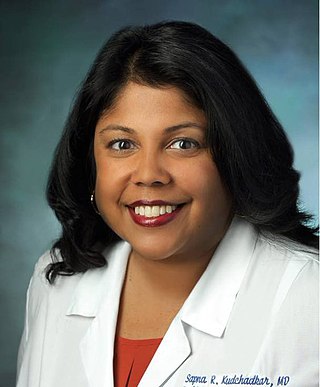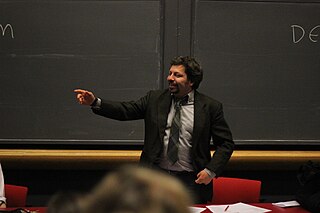Related Research Articles
Bioethics is both a field of study and professional practice,interested in ethical issues related to health,including those emerging from advances in biology,medicine,and technologies. It proposes the discussion about moral discernment in society and it is often related to medical policy and practice,but also to broader questions as environment,well-being and public health. Bioethics is concerned with the ethical questions that arise in the relationships among life sciences,biotechnology,medicine,politics,law,theology and philosophy. It includes the study of values relating to primary care,other branches of medicine,ethical education in science,animal,and environmental ethics,and public health.

Arthur L. Caplan is an American ethicist and professor of bioethics at New York University Grossman School of Medicine.

Gregory E. Pence is an American philosopher.
Matthew K. Wynia is an American physician and bioethicist who has been the director of the Center for Bioethics and Humanities at the University of Colorado's Anschutz Medical Campus since 2015. He also oversees an art gallery and forum there. He previously directed the American Medical Association's Institute on Ethics for 15 years. He also previously served as an assistant professor of medicine at the University of Chicago,as the president of the American Society for Bioethics and Humanities,and as the director of patient and physician engagement at the American Medical Association in Chicago.
Albert R. Jonsen was one of the founders of the field of Bioethics. He was Emeritus Professor of Ethics in Medicine at the University of Washington,School of Medicine,where he was Chairman of the Department of Medical History and Ethics from 1987 to 1999. After retiring from UW,he returned to San Francisco,where he co-founded the Program in Medicine and Human Values at Sutter Health's California Pacific Medical Center in 2003.

Jacob M. Appel is an American polymath,author,bioethicist,physician,lawyer and social critic. He is best known for his short stories,his work as a playwright,and his writing in the fields of reproductive ethics,organ donation,neuroethics,and euthanasia. Appel's novel The Man Who Wouldn't Stand Up won the Dundee International Book Prize in 2012. He is the director of Ethics Education in Psychiatry and a professor of psychiatry and medical education at the Mount Sinai School of Medicine,and he practices emergency psychiatry at the adjoining Mount Sinai Health System. Appel is the subject of the 2019 documentary film Jacob by director Jon Stahl.
David John Doukas,is an American family physician and bioethicist. He holds the James A. Knight Chair of Humanities and Ethics in Medicine,and directs the Program in Medical Ethics and Human Values at Tulane University's School of Medicine. Prof. Doukas is also the Executive Director of the Master of Science in Bioethics and Medical Humanities at Tulane University. Additionally,Dr. Doukas serves as the Health Care Chief Ethics Consultant at the Southeast Louisiana Veterans Health Care System in New Orleans as well as the VISN16 Clinical Ethics Liaison. Professor Doukas was Founding President of the Academy for Professionalism in Health Care,for which he was awarded the first Presidential Award at the Academy for Professionalism in Health Care Annual Meeting in June 2023,for his efforts as Founder and President of APHC for seven years (2012–2019). In a 2023 analysis of the top 100 cited articles in ethics education,Prof. Doukas was "recognized as one of the most influential authors in the field of ethics education,with five articles in the top 10 list attributed to his name that have amassed a total of 296 citations."

Mildred Z. Solomon is an American bioethics researcher.
John D. Lantos is an American pediatrician and a leading expert in medical ethics. He was Professor of Pediatrics at the University of Missouri–Kansas City School of Medicine and Director of the Children's Mercy Bioethics Center at Children's Mercy Hospital. Lantos has been cited over 16,000 times in scientific literature as of 2024.

Robert D. Truog is an American bioethicist and pediatrician. He is the Frances Glessner Lee Professor of Medical Ethics,Anaesthesiology &Pediatrics at Harvard Medical School,where he is also the Director of the Center for Bioethics. He also practices in the pediatric intensive care unit at Boston Children’s Hospital,where he previously served as chair of the Division of Critical Care Medicine.
Crystal C. Watkins Johansson is an American neuroscientist and psychiatrist and associate professor of neuroscience at Johns Hopkins University School of Medicine as well as the director of the Sheppard Pratt Memory Clinic in Neuropsychiatry in Baltimore,Maryland. Johansson was the first Black female Meyerhoff Scholar to obtain an MD/PhD from the University of Maryland,Baltimore County. During her MD/PhD she developed a novel treatment for gastrointestinal in patients with diabetes that led to a patent for a pharmacological compound in 2000. Johansson is a practicing neuropsychiatrist with a focus on geriatric psychiatry and she conducts brain imaging research as well as research on cancer in African American women.

Sapna Ravi Kudchadkar is an American critical care physician and anesthesiologist. She is a professor of anesthesiology and critical care medicine,pediatrics and physical medicine and rehabilitation at the Johns Hopkins School of Medicine. In 2022,she was appointed Vice Chair of Pediatric Anesthesiology and Critical Care Medicine at Johns Hopkins as well as Anesthesiologist-in-Chief of the Johns Hopkins Charlotte R. Bloomberg Children's Center.

Nir Eyal is a bioethicist and Henry Rutgers Professor of Bioethics and Director of the Center for Population–Level Bioethics at Rutgers University in New Jersey. He was formerly a bioethicist in the Department of Global Health and Population of the Harvard T.H. Chan School of Public Health and the Department of Global Health and Social Medicine of the Harvard Medical School. He has long worked closely with Harvard bioethicist Daniel Wikler. Eyal's current visibility concerns his role in studying the ethics of human challenge trials in HIV,malaria,and coronavirus vaccine development. He has also written on 'bystander risks' during pandemics and infectious diseases and contract tracing during ebola.
Kelly Anne Gebo is an American epidemiologist and infectious disease specialist. She was the inaugural Vice Provost for Education at Johns Hopkins University and served as the Chief Medical and Scientific Officer for the All of Us Research Program at the National Institutes of Health.
David Wesley Dowdy is an American infectious disease epidemiologist. He is the B. Frank and Kathleen Polk Professor at Johns Hopkins Bloomberg School of Public Health.
Suzanne Louise Topalian is an American surgical oncologist. She is the Bloomberg-Kimmel Professor of Cancer Immunotherapy in the Bloomberg-Kimmel Institute for Cancer Immunotherapy at Johns Hopkins University School of Medicine. In this role,she studies human anti-tumor immunity.
Felicia Hill-Briggs was an American behavioral and social scientist.
Tina Lee Cheng is an American pediatrician. In 2020,she was named the Chair of Pediatrics,Chief Medical Officer,and Research Foundation Director of Cincinnati Children's Hospital Medical Center and was previously Director of Pediatrics and Pediatrician-In-Chief at Johns Hopkins University.
Nancy Ann Silbergeld Jecker is a bioethicist,philosopher,and author. She is Professor of Bioethics and Humanities at the University of Washington School of Medicine,Department of Bioethics and Humanities,with Adjunct Professorships at the university's Department of Philosophy,School of Law,and Department of Global Health. She also holds visiting professorships at the University of Johannesburg,Gauteng South Africa and the Chinese University of Hong Kong Centre for Bioethics
Julie Renee Brahmer is an American thoracic oncologist. She is the co-director of the Upper Aerodigestive Department within the Bloomberg~Kimmel Institute for Cancer Immunotherapy at Johns Hopkins University and the Marilyn Meyerhoff Professor in Thoracic Oncology.
References
- ↑ Levin, Jay (July 7, 2015). "Daniel Sugarman, psychologist and published author". Hackensack, New Jersey: The Record. Retrieved March 19, 2021– via newspapers.com.
- ↑ "Paramus club has gymnasitcs". The Ridgewood News. November 27, 1977. Retrieved March 19, 2021– via newspapers.com.
- 1 2 "Paramus". The Record. June 8, 1982. Retrieved March 19, 2021– via newspapers.com.
- ↑ "Phi Beta Kappa". The Sunday News. January 16, 1983. Retrieved March 19, 2021– via newspapers.com.
- ↑ "Jeremy Sugarman, M.A., M.D., M.P.H." hopkinsmedicine.org. Retrieved March 19, 2021.
- ↑ "Bright & Brief". The Central New Jersey Home News. September 26, 1986. Retrieved March 19, 2021– via newspapers.com.
- ↑ Selinsky, Debbie (September 28, 1986). "Patients are words apart from their doctors". The Tampa Tribune. Retrieved March 19, 2021– via newspapers.com.
- ↑ "Up for debate". The News and Observer. September 1, 1999. Retrieved March 19, 2021– via newspapers.com.
- ↑ "The History of Hopkins GIM: Thirty-Five Years of Medicine Without Limits". hopkinsmedicine.org. Retrieved March 19, 2021.
- ↑ "25th Anniversary Historical Highlight: Harvey Meyerhoff Endows Professorship". bioethics.jhu.edu. January 24, 2020. Retrieved March 19, 2021.
- ↑ "Dr. Jeremy Sugarman Earns PRIMR Distinguished Service Award". hopkinsmedicine.org. 2008. Retrieved March 19, 2021.
- ↑ "BIOETHICIST JEREMY SUGARMAN ELECTED TO AAP". bioethicsinstitute.org. 2013. Retrieved March 19, 2021.
- ↑ "GIM's Dr. Jeremy Sugarman Elected to IOM". hopkinsmedicine.org. 2010. Retrieved March 19, 2021.